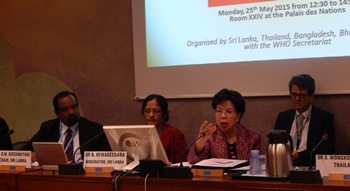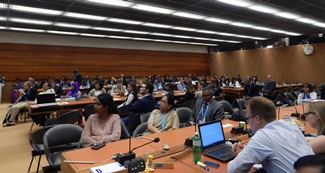
21 July 2016 Today Sri Lanka received certification from WHO for having eliminated lymphatic filariasis - one of the oldest and most debilitating, neglected tropical diseases. WHO Regional Director, Dr Poonam Khetrapal Singh, presented the certificate to Minister of Health, Dr Rajitha Senaratne, at a ceremony in Colombo.
“The Ministry of Health has prioritized the elimination of this neglected tropical disease for several decades. We have now reached a major turning point, eliminating lymphatic filariasis as a public health problem," said Dr Rajitha Senarathne, Minister of Health, Nutrition & Indigenous Medicine.


Minister of Health, Nutrition and Indigenous Medicine Dr Rajitha Senaratne on Tuesday (24 May 2016) drew the attention of the 69th World Health Assembly (WHA) meeting in Geneva to the recent floods and landslides in Sri Lanka that affected nearly half a million people and appreciated the expression of solidarity and support by countries, partners and the World Health Organization (WHO), to strengthen the timely health response to the affected people.
Addressing the Assembly under this years’ theme, “Transforming our World: the 2030 Agenda for Sustainable Development “, Minister Senaratne stated that “the Government of Sri Lanka is fully committed to the Sustainable Development Agenda and has already set up a multi sectoral Sustainable Development Secretariat to achieve this goal”. Drawing attention to the increasing influx of migration, Minister highlighted the need to pay attention to the health of migrants, irrespective of their status of migration. In this context, he recalled the offer made by the President of Sri Lanka to host the second Global Consultation on Health of Migrants in Sri Lanka October this year, and stated that Sri Lanka is envisaging a political declaration as the outcome of the Global Consultation to demonstrate the commitment to this important issue.



Dr. Margaret Chan, the Director General of the World Health Organization (WHO) has said "“Pictorial warning is the most cost effective means of controlling tobacco related Non Communicable Diseases (NCDs), including cancer “, and that "countries can get return on their investment in multiple areas". Paying tribute to countries including Sri Lanka whom she said "had the courage to keep going despite heavy resistance by the tobacco industry", Dr. Chan said "without our joint effort, you know what effect tobacco would take. We should not allow an industry to intimidate governments, make money and leave you with all the health consequences". She urged that "the international community come together to fight the tobacco industry".
Dr. Chan made these observations when she inaugurated a session on the theme “Strategies to overcome resistance against pictorial warning messages in tobacco products”, hosted by Sri Lanka on the sidelines of the 68th World Health Assembly at the Palais des Nations in Geneva on Monday (25th May 2015).



Minister of Health and Indigenous Medicine Dr Rajitha Senartne today (19 May 2015) addressed the 68th World Health Assembly held in Geneva and highlighted the progress Sri Lanka has made in achieving the Millennium Development Goals and universal health coverage, particularly with respect to Maternal & Child Health and the control of communicable diseases.
Highlighting the health scenario in the country he said that under the guidance of President Maithripala Sirisena, the country is poised to enter a new phase of health development and pointed out that the health burden of the country is now moving more towards non communicable diseases, such as cardiovascular, respiratory neoplasm and diabetes, which account to over 70% of deaths.

Minister of Health and Vice President of the 67th World Health Assembly, Maithripala Sirisena, addressing the World Health Assembly today (20th May 2014) said “the World Health Assembly has a historic opportunity to once again appeal to the world community to demand those countries releasing large amount of carbon-dioxide and offensive gases to the atmosphere - to adopt carbon free energy sources to run their industries. These developed nations should be held responsible for releasing large quantities of offensive gases, and the people in developing and poor countries are the victims that have to bear the consequences. Let us all be eco-centered rather than ego-centered so that we can all live happily and with good health and leave to the future generations a much better and a healthy place to live in.
